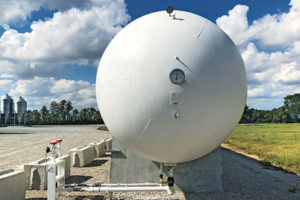Promoting safety in barns, greenhouses
The average confinement livestock barn in the Midwest has housed animals for almost 20 years, with the oldest buildings in service nearly 40 years. In such aging environments, potential problems can arise with nearly every aspect of construction, including propane-powered heating systems.
The high ammonia levels in animal waste create corrosive environments for metal components in livestock barns. In greenhouses, hot, humid conditions can corrode heating systems. So whether your propane customers raise hogs, turkeys or plants, encourage them to be proactive in system maintenance to keep everyone safe.
“Working with customers to regularly inspect heating systems is one of the best ways to avoid accidents or system failures,” says Ken Mueller, hazardous gas safety technician with CHS. He suggests the following five safety strategies when working with customers.
1. Emphasize the need for regular system checks. Review with customers the need for yearly visual inspections of all parts of propane supply and heating systems, both inside and outside structures. Conduct leak checks to ensure the system holds pressure. “Ideally, they should be done every one to two years, but certainly every five years,” says Mueller.
Often, pipes are enclosed behind walls or ceilings, making visual checks more difficult. “But leak checks should verify that the system is sound and leak free,” Mueller notes.
It’s also important to service the vaporizer annually. “Remove any debris that has collected inside the cover that could cause a fire or prevent it from operating efficiently, and follow all manufacturer’s maintenance recommendations,” he adds.
2. Plan ahead to coordinate system checks. In confinement livestock operations with strict biosecurity protocols, entry into buildings to inspect heating system components is often not allowed when animals are present. Plan ahead with producers to gain access between animal batches and before barns have been sanitized.
“Coordinating propane system checks with regular insurance inspections can improve convenience for everyone,” says Mueller.
3. Offer help in educating employees. It’s the responsibility of the livestock producer or greenhouse manager to thoroughly train new employees about all aspects of the structure, including the heating system. You can facilitate that process by offering safety information sessions that educate employees about all parts of the heating system.
“While propane is odorized, the smell of animal waste in many barns may overpower it. Workers may not always be able to detect a gas leak by scent, so they need to be aware of other danger signs,” says Mueller. “All employees should also know where and how to safely shut off the propane supply if they suspect a leak or spot a problem.”
The Propane Education & Research Council offers several safety videos that could be incorporated into a basic employee safety session. View them at propane.com by navigating to the safety tab from the homepage.
4. Get involved in new construction. The best time for a propane supplier to get involved with a new livestock building is in the design stage. This allows a propane expert to offer recommendations on the best types of pipe and fittings to be used and to consult on heating system layout, as well as to ensure propane tanks and vaporizers are properly located and appropriately sized.
5. Recommend inspection of newly purchased structures. When a customer buys an existing barn or greenhouse, the propane system should be thoroughly inspected to ensure it is working properly and all components are up to code. “This inspection will also allow the supplier to recommend any upgrades that could make the heating system more efficient,” says Mueller.
Scott Pearson is the director of risk and asset development for CHS.
NOTE: The opinions and viewpoints expressed herein are solely the author’s and should in no way be interpreted as those of LP Gas magazine or any of its staff members.

















